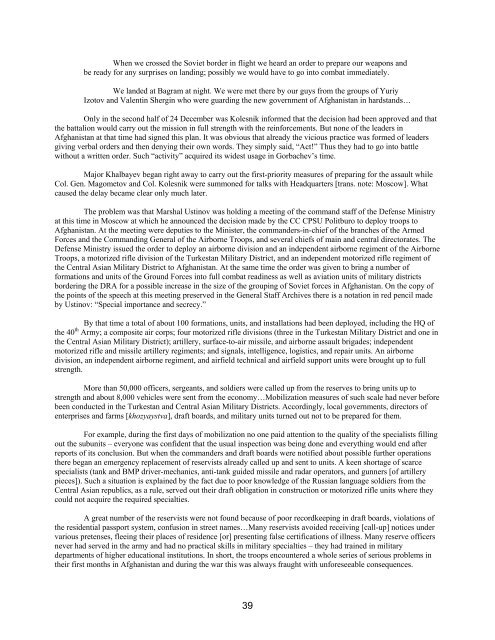Aleksandr Antonovich Lyakhovskiy Working Paper pp - Woodrow ...
Aleksandr Antonovich Lyakhovskiy Working Paper pp - Woodrow ...
Aleksandr Antonovich Lyakhovskiy Working Paper pp - Woodrow ...
You also want an ePaper? Increase the reach of your titles
YUMPU automatically turns print PDFs into web optimized ePapers that Google loves.
When we crossed the Soviet border in flight we heard an order to prepare our weapons and<br />
be ready for any surprises on landing; possibly we would have to go into combat immediately.<br />
We landed at Bagram at night. We were met there by our guys from the groups of Yuriy<br />
Izotov and Valentin Shergin who were guarding the new government of Afghanistan in hardstands…<br />
Only in the second half of 24 December was Kolesnik informed that the decision had been a<strong>pp</strong>roved and that<br />
the battalion would carry out the mission in full strength with the reinforcements. But none of the leaders in<br />
Afghanistan at that time had signed this plan. It was obvious that already the vicious practice was formed of leaders<br />
giving verbal orders and then denying their own words. They simply said, “Act!” Thus they had to go into battle<br />
without a written order. Such “activity” acquired its widest usage in Gorbachev’s time.<br />
Major Khalbayev began right away to carry out the first-priority measures of preparing for the assault while<br />
Col. Gen. Magometov and Col. Kolesnik were summoned for talks with Headquarters [trans. note: Moscow]. What<br />
caused the delay became clear only much later.<br />
The problem was that Marshal Ustinov was holding a meeting of the command staff of the Defense Ministry<br />
at this time in Moscow at which he announced the decision made by the CC CPSU Politburo to deploy troops to<br />
Afghanistan. At the meeting were deputies to the Minister, the commanders-in-chief of the branches of the Armed<br />
Forces and the Commanding General of the Airborne Troops, and several chiefs of main and central directorates. The<br />
Defense Ministry issued the order to deploy an airborne division and an independent airborne regiment of the Airborne<br />
Troops, a motorized rifle division of the Turkestan Military District, and an independent motorized rifle regiment of<br />
the Central Asian Military District to Afghanistan. At the same time the order was given to bring a number of<br />
formations and units of the Ground Forces into full combat readiness as well as aviation units of military districts<br />
bordering the DRA for a possible increase in the size of the grouping of Soviet forces in Afghanistan. On the copy of<br />
the points of the speech at this meeting preserved in the General Staff Archives there is a notation in red pencil made<br />
by Ustinov: “Special importance and secrecy.”<br />
By that time a total of about 100 formations, units, and installations had been deployed, including the HQ of<br />
the 40 th Army; a composite air corps; four motorized rifle divisions (three in the Turkestan Military District and one in<br />
the Central Asian Military District); artillery, surface-to-air missile, and airborne assault brigades; independent<br />
motorized rifle and missile artillery regiments; and signals, intelligence, logistics, and repair units. An airborne<br />
division, an independent airborne regiment, and airfield technical and airfield su<strong>pp</strong>ort units were brought up to full<br />
strength.<br />
More than 50,000 officers, sergeants, and soldiers were called up from the reserves to bring units up to<br />
strength and about 8,000 vehicles were sent from the economy…Mobilization measures of such scale had never before<br />
been conducted in the Turkestan and Central Asian Military Districts. Accordingly, local governments, directors of<br />
enterprises and farms [khozyaystva], draft boards, and military units turned out not to be prepared for them.<br />
For example, during the first days of mobilization no one paid attention to the quality of the specialists filling<br />
out the subunits – everyone was confident that the usual inspection was being done and everything would end after<br />
reports of its conclusion. But when the commanders and draft boards were notified about possible further operations<br />
there began an emergency replacement of reservists already called up and sent to units. A keen shortage of scarce<br />
specialists (tank and BMP driver-mechanics, anti-tank guided missile and radar operators, and gunners [of artillery<br />
pieces]). Such a situation is explained by the fact due to poor knowledge of the Russian language soldiers from the<br />
Central Asian republics, as a rule, served out their draft obligation in construction or motorized rifle units where they<br />
could not acquire the required specialties.<br />
A great number of the reservists were not found because of poor recordkeeping in draft boards, violations of<br />
the residential passport system, confusion in street names…Many reservists avoided receiving [call-up] notices under<br />
various pretenses, fleeing their places of residence [or] presenting false certifications of illness. Many reserve officers<br />
never had served in the army and had no practical skills in military specialties – they had trained in military<br />
departments of higher educational institutions. In short, the troops encountered a whole series of serious problems in<br />
their first months in Afghanistan and during the war this was always fraught with unforeseeable consequences.<br />
39

















